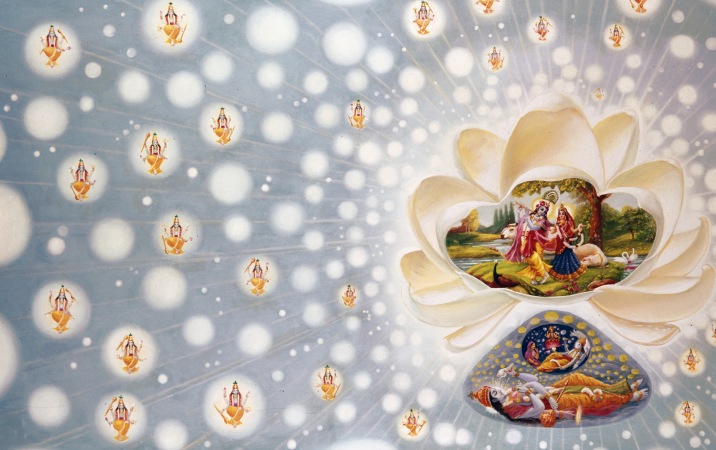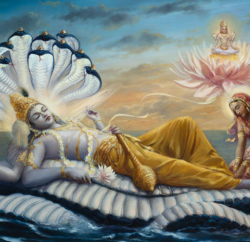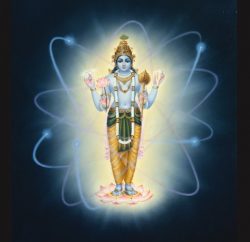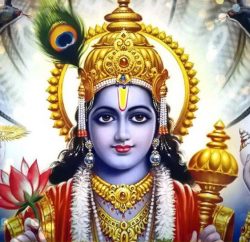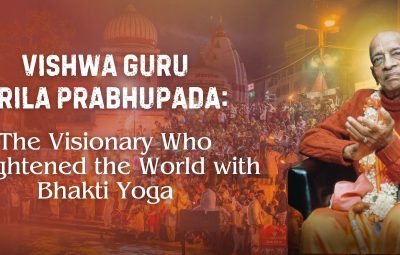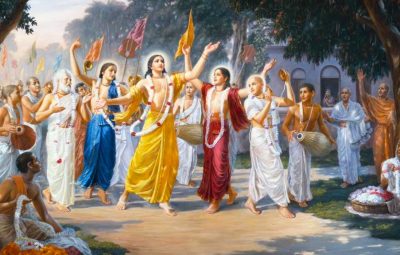Lord Brahma told his son, Narada Muni, “I shall narrate to you the glories of Haribodhini Ekadashi, which eradicates all kinds of sins and bestows great merit, and ultimately liberation, upon those who surrender unto the Supreme Lord. Utthana Ekadashi, which occurs during the light fortnight of the month of Kartika, is much more purifying than a bath at a place of pilgrimage.”
Narada Muni asked his father, “Please describe the relative merits of fasting on Ekadashi, by eating once at midday and at supper (without grains or beans).”
Lord Brahma replied,
“If a person eats once at midday on Ekadashi, the sins of his previous birth are erased, if he eats the only supper, the sins acquired during his previous two births are removed, and if he fasts completely, the sins accumulated during his pervious seven births are eradicated. The sins a person has accumulated over a thousand previous births are burned to ashes if he not only fasts but also remains awake throughout Ekadashi night.
If one does a small amount of pious activity on this day, following the rules and regulations, he will earn great merit. One who does not chant the Gayatri mantra thrice a day, who disregards fasting days, who cheats others, etc., such a sinful person can never perform any religious activity effectively; whether a brahmana or a shudra.
One who fasts and remains awake overnight on this Ekadashi achieves unlimited merit and after death goes to the supreme abode of Lord Vishnu, and then his ancestors, relatives, and descendants also reach that abode. As death is certain, losing one’s wealth is also certain. Knowing this, one should observe a fast on this day which is so dear to Hari – Sri Haribodhini Ekadashi.
Whoever fasts on this Ekadashi will not enter a womb again. Persons desirous of beauty and happiness should observe Haribodhini Ekadashi, especially if it falls on Dvadashi. The sins committed during childhood, youth and old age in all those lifetimes, are nullified by the Supreme Lord Govinda by fasting on Haribodhini Ekadashi with devotion.
On this day a devotee should not eat in another’s house or eat food cooked by a non-devotee. By doing so, he achieves only the merit of fasting on a full moon day. One who wants to observe this Ekadashi should wake up early morning, during the Brahma-muhurta hour. He should then clean his teeth and bathe in a lake, river, pond, or well, or in his own home, as convenient. After worshipping Lord Keshava, he should listen carefully to the sacred descriptions of the Lord. He should pray to the Lord thus: ‘O Lord Keshava, I shall fast on this day, which is so dear to You, and tomorrow I shall honour Your sacred prasadam. Kindly protect me, You are my only shelter.’
One should worship Sri Krishna with camphor, fruits, and aromatic flowers, especially the yellow agaru flower. One should not absorb oneself in making money on this important day. In other words, greed should be exchanged for charity. This is the process of turning loss into unlimited merit. One should offer many kinds of fruits to the Lord and bathe Him with water from a conch shell.
One, who sees Tulasi Maharani, touches her, mediates on her, narrates her history, offers obeisances to her, prays to her for her grace, plants her, worships her, or waters her lives in the abode of Lord Hari eternally. O Narada, one who serves Tulasi-Devi in these nine ways achieves happiness in the higher world.
On this Ekadashi, Chaturmasya ends, so whatever one gave up during Chaturmasya should now be donated to Brahmanas. One who follows this process of Chaturmasya receives unlimited merit.”
Thus ends the narration of the glories of Kartika-Shukla Ekadashi – also known as Haribodhini Ekadashi or Devotthani Ekadashi – from the Skanda Purana.


